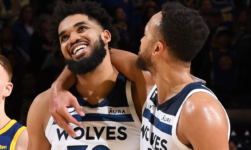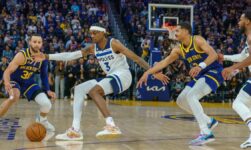The Dallas Mavericks have acquired Willie Cauley-Stein from the Golden State Warriors, according to Adrian Wojnarowski of ESPN.
Dallas traded young forward Isaiah Roby to the Oklahoma City Thunder earlier Friday in order to clear the roster spot necessary to make this move possible. The Mavericks desperately needed a center after their starter at the position, Dwight Powell, ruptured his Achilles tendon. Powell is expected to miss the rest of this season, and in all likelihood part of next season as he recovers. Cauley-Stein has a player option for next season worth just over $2.3 million.
In exchange for Cauley-Stein, the Warriors will receive Utah’s 2020 second-round draft pick. Ironically, the Mavericks hold Golden State’s 2020 second-round pick from the Andrew Bogut trade of 2016. While that return is fairly small, the move had important financial implications for Golden State. With that in mind, let’s grade the deal:
Warriors trade grade: B+
No, Utah’s 2020 second-round pick does not drastically alter Golden State’s long-term fortunes. Getting Cauley-Stein off of the roster, though, was fairly important to the Warriors from a financial perspective. Aside from having a player-option for next season that Golden State no longer has to worry about, the Warriors have also been hovering just beneath the luxury tax apron for most of the season. Their acquisition of D’Angelo Russell hard-capped them at that number, and as a result, Golden State has spent most of this season with only 14 players on its roster.
But by trading Cauley-Stein, the Warriors managed to shave the $2.2 million or so that he is owed off of their books entirely. That gives them $2.57 million in total underneath the hard cap, according to ESPN’s Bobby Marks, and while Cauley-Stein’s contract comes off of the books fully after being traded, any new contracts that they sign would be prorated based on the amount of time left in the season. Put simply: the Warriors have enough money to actually fill out their roster now.
So who will they sign with this newfound flexibility? It will almost certainly be their two-way players, Ky Bowman and Marquese Chriss. Bowman is nearly out of service days at the NBA level, having already played in 37 games for Golden State. Two-way players can spend only 45 days with their NBA teams. Chriss, meanwhile, started the season on an NBA contract, but was released in order to make room for Damion Lee, who started the season on a two-way deal but ran out of service days and needed to be converted. Assuming that is how the Warriors spend this money, they will also be able to sign two new players to two-way deals. Golden State’s track record with G League players is quite strong, as Lee, Bowman and Alen Smailagic (and Quinn Cook years ago) all spent development time in Santa Cruz. Those extra two-way slots could help them discover another diamond in the rough.
If the Warriors wanted Cauley-Stein on next year’s roster, they wouldn’t have made this trade. That they did suggests that they not only managed to dump a player who wasn’t part of their future, but managed to save enough cash to reward two players who might be while picking up a second-round pick in the process. Not bad at all.
Mavericks trade grade: A-
The Mavericks would have had no reason to make this trade a week ago, but Dwight Powell’s injury changed the entire equation. Dallas relies as much on the pick-and-roll as just about any team in the NBA, and Powell’s athleticism made him an essential component of that scheme. He scored 1.35 points per possession as a pick-and-roll finisher this season, one of the highest marks in the NBA.
Cauley-Stein isn’t nearly that good, but at 1.14 points per possession as a pick-and-roll finisher, he is at least above-average in that regard. It’s also worth noting that he has largely played with underwhelming ball-handlers. D’Angelo Russell is Golden State’s only decent pick-and-roll option, and in Sacramento, he either had a young De’Aaron Fox or a series of forgettable backups. The upgrade to Luka Doncic will be massive, and his numbers should improve as a result. For all of his struggles, Cauley-Stein is still an elite athlete. Doncic will be able to maximize him in ways other teams haven’t. In fact, SportsLine projections indicate that the addition of Cauley-Stein improves their projected win total by one game, offsetting the loss of Powell.
The other major benefit for Dallas here is that Cauley-Stein is a better rebounder than Powell. Cauley-Stein has a rebound rate of 14.4 percent compared to Powell’s 11.2 percent, and while Powell led the Mavericks in boxouts at 3.4 per game, Cauley-Stein averaged 3.6 for Golden State despite playing four fewer minutes per game. Throw in the extra minutes this swap will likely create for elite rebounder Boban Marjanovic, and Powell’s injury should at least help Dallas on the boards a bit. Considering they were already sixth in the NBA in rebounding rate, that bodes very well for them.
There will be some stylistic clashes. Rick Carlisle is not going to stand for Cauley-Stein’s bizarre fixation on mid-range jumpers. His defense can be inconsistent as well, and it will take him time to develop chemistry with Dallas’ ball-handlers. But the price here was a second-round pick that should fall in the 50s. It’s hard to imagine them doing any better than this without putting a real asset on the table. Cauley-Stein can give them real minutes. With Powell out, finding someone who could do that quickly was a priority.






